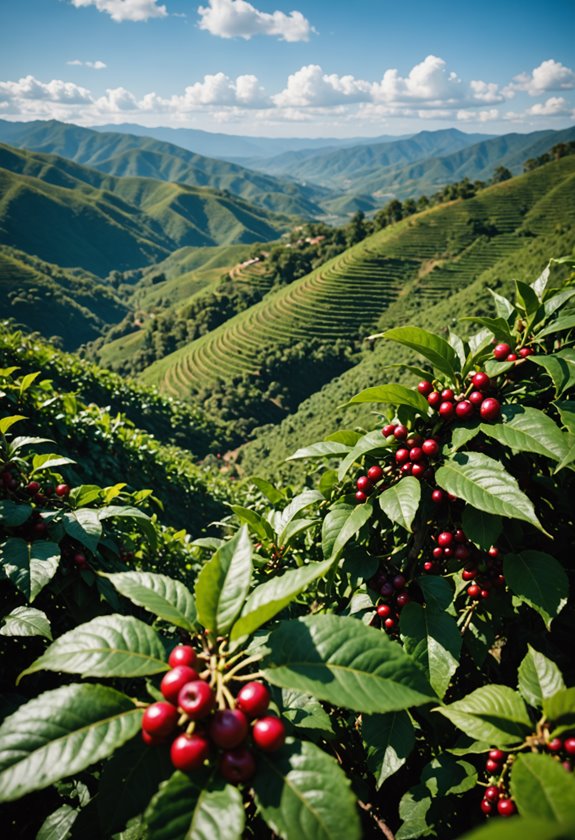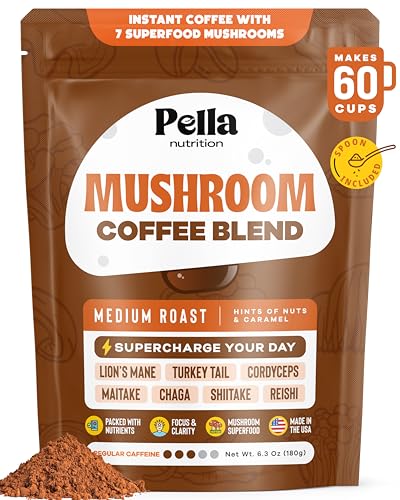Which Country Exports the Most Coffee Beans?
Let’s investigate which country leads in coffee bean exports. Brazil stands at the forefront, holding 28.9% of the global export market. This translates to exporting an impressive 2.20 million tonnes of coffee beans as of 2019. The country’s dominance is rooted in its vast growing regions like Minas Gerais and São Paulo, which offer perfect climates and soils, ideal for producing high-quality Arabica beans. While Vietnam follows with 18.9% and Colombia contributes 10.1% to global exports, Brazil’s large-scale production supports local communities economically. There’s much more to learn about coffee’s impact on the world stage.
Key Takeaways
- Brazil is the largest coffee exporter, with 28.9% of global exports.
- In 2019, Brazil exported 2.20 million tonnes of coffee beans.
- Brazil’s major coffee-growing regions are Minas Gerais, Espírito Santo, and São Paulo.
- Brazil has a significant historical presence in the coffee industry.
- Climate and soil in Brazil are ideal for high-quality Arabica beans.
Global Coffee Export Leaders

When you’re looking at global coffee export leaders, Brazil stands out as the dominant player, accounting for nearly 28.9% of worldwide exports with a staggering 2.20 million tonnes in 2019. This makes Brazil the top in the coffee exporting world.
But what makes Brazil’s exported coffee so important? It’s the sheer volume and quality that place it at the forefront of the coffee market. Brazil has been a major producer for decades, with its vast plantations and ideal growing conditions, contributing greatly to its status among coffee exporters.
Vietnam is the second-largest coffee exporter, responsible for 18.9% of global exports with 1.44 million tonnes. Known for its strong beans, Vietnam‘s role in the global coffee market is vital. The country’s rapid growth in coffee exporting showcases its ability to compete with global coffee giants.
Next is Colombia, contributing 10.1% of global coffee exports with 0.77 million tonnes. Colombian coffee is celebrated for its rich flavor profile, making it a favorite among coffee enthusiasts.
Together, Brazil, Vietnam, and Colombia, the top three major producers, represent over 57% of worldwide coffee exports.
Let’s investigate how these nations shape the coffee exporters’ terrain.
Brazil’s Dominance in Coffee Exports
Despite the fierce competition in the global coffee market, Brazil maintains its dominance with an impressive 28.9% share of worldwide exports, amounting to 2.20 million tonnes in 2019.
As the largest coffee exporter, Brazil’s influence is undeniable, reinforced by a rich history in coffee production and prime growing conditions.
Vietnam and Colombia follow Brazil as key players in global coffee production.
Key Regions and Arabica Beans
Let’s investigate why Brazil stands out. The country’s coffee production thrives in regions like Minas Gerais, Espírito Santo, and São Paulo.
These areas offer ideal climates and soils, perfect for cultivating high-quality Arabica beans. Known for their smooth flavor and rich aroma, these beans make Brazil a favored choice among coffee enthusiasts worldwide.
Economic Impact and Export Value
In 2022, Brazil’s coffee exports reached a value of around $8.86 billion, strengthening its stronghold in the global coffee market.
This sector not only enhances the economy but also provides jobs and supports local communities. Coffee farming in Brazil is more than just a business; it’s a lifeline for many families, intertwining cultural heritage with economic necessity.
Major Exporting Countries

Several nations play essential roles in the global coffee export market, each contributing considerably to the industry. Let’s examine the major players.
Dominating the scene is Brazil, the largest coffee exporter worldwide. It ships a staggering 2.20 million tonnes of coffee beans, making up about 28.9% of global exports. This South American giant sets the pace for others to follow.
Not far behind is Vietnam, holding the second spot in global coffee exports. Vietnam contributes 18.9% of the market, exporting 1.44 million tonnes. Known for its strong beans, Vietnam is a significant player in the coffee trade.
Colombia is another South American powerhouse in the coffee world. As the third-largest exporter, Colombia ships 0.77 million tonnes, representing 10.1% of global exports. Its coffee is renowned for its mild, aromatic flavor, which is highly sought after worldwide.
Together, South American nations like Brazil and Colombia account for 42% of all coffee exports, showcasing the region’s dominance.
Other key exporters include Indonesia, partnering with Vietnam to make up 23.4% of global coffee exports. Each of these countries plays an essential role in satisfying the world’s ever-growing demand for coffee beans.
Vietnam specializes in producing Robusta coffee beans, which are known for their higher caffeine content and stronger, more bitter flavor profile.
Future Trends in Coffee Exports
As you investigate the terrain of coffee exports, it’s clear the industry isn’t static. The future of coffee exports will heavily depend on sustainable coffee practices. As consumers increasingly demand ethical products, coffee-exporting regions must adapt their export strategies to meet these expectations.
Let’s examine how this affects you.
Impact of Climate Change
Climate change will likely alter traditional coffee-exporting regions. Areas like Brazil and Vietnam might face challenges while emerging coffee-producing regions gain prominence.
You’ll see new areas better suited for coffee cultivation stepping into the spotlight, diversifying the global export environment.
Technological Advancements
Technological advancements are ready to revolutionize coffee farming. By enhancing efficiency and productivity, these innovations allow countries to remain competitive.
You’ll notice that these changes can lead to more consistent coffee quality and supply, vital for meeting global demand.
Rising Demand for Specialty Coffee
Specialty coffee is on the rise, and this trend will shape export strategies. Countries will need to focus on producing high-quality beans to cater to this niche market.
As a consumer, you’ll benefit from a greater variety of flavors and origins, reflecting the changing nature of coffee exports.
Health-conscious consumers can enjoy coffee beans for their high antioxidant content while maintaining dietary restrictions.







